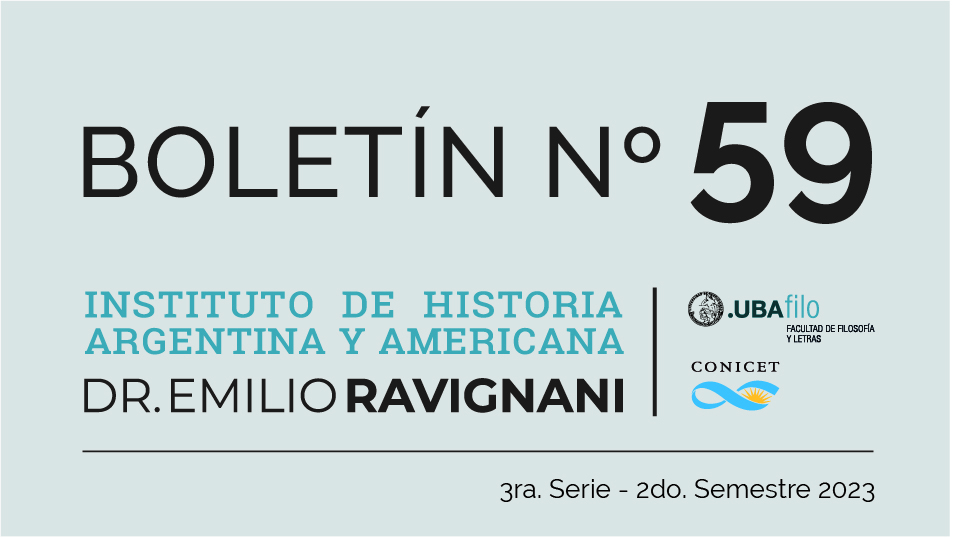From the shore. A balance and research agenda on the sociocultural history of Malvinas
Abstract
The article makes comments on the text by Federico Lorenz’s “Everything is (was) to be done. A personal tour. Reflections and proposals forty years after the Malvinas war”. Based on Lorenz's proposals, it resumes and deepens the analysis of the challenges, conditioning factors and difficulties that we historians who research on Malvinas (the symbol that represents both a territory and a national cause as well as a war) face. In particular, the work addresses two of these limitations: those caused by taking care of a problem that is linked to the construction of a national cause, and therefore indisputable and sacred; and those produced by the struggles for the meaning of war within the disciplinary field.Downloads
References
Franco, M. y Levin, F. (2007). El pasado cercano en clave historiográfica. En M. Franco y F. Levin (Comps.), Historia reciente. Perspectivas y desafíos para un campo en construcción. Buenos Aires: Paidós.
Garaño, S. (2014). Entre el cuartel y el monte. Soldados, militantes y militares durante el Operativo Independencia (1975-1977), Tesis doctoral, UBA.
Guber, R. (2001). ¿Por qué Malvinas? De la causa nacional a la guerra absurda. Buenos Aires: FCE.
Guerrero Iraola, J. (2021). Tecnologías de impunidad. Cómo la dictadura intentó ocultar los crímenes cometidos durante la guerra de Malvinas. La Plata: EDULP-CECIM.
Hobsbawn, E. (1998). La Historia de la identidad no es suficiente. En E. Hobsbawn, Sobre la Historia. Barcelona: Crítica.
Lorenz, F. (2007). La necesidad de Malvinas. Puentes, 20.
Lorenz, F. (2014). Todo lo que necesitás saber sobre Malvinas. Buenos Aires: Paidós.
Lorenz, F. (2021). Visita a un sentimiento nacional. El Museo Malvinas e Islas del Atlántico Sur. Cuadernos del Instituto Ravignani, 1, Segunda Serie.
Lorenz, F. (2022). Malvinas. Historia, conflictos, perspectivas. Bueno Aires: SB.
Niebieskikwiat, N. (2012). Lágrimas de hielo. Torturas y violaciones a los derechos humanos en la guerra de Malvinas. Buenos Aires: Norma.
Palermo, V. (2007). Sal en las heridas. Buenos Aires: Sudamericana.
Rodríguez, A. B. (2017). Por una Historia Sociocultural de la guerra y posguerra de Malvinas. Nuevas preguntas para un objeto de estudio clásico. PolHis. Revista Bibliográfica del Programa Interuniversitario de Historia Política, año 10, 20.
Rodríguez, A. B. (2021). Silence after Defeat. The early post-war period for the former argentine soldiers of the Apostadero Naval Malvinas. En E. Duarte (Ed.), The Falklands/Malvinas War in the South Atlantic. Palgrave Macmillan.
Rodríguez, A. B. (2022). Malvinas: la pervivencia de la causa nacional y sagrada. En F. Mare, A. Petruccelli, A. B. Rodríguez y A. Penissi, Si quieren venir que vengan. Malvinas: genealogías, guerra, izquierdas. Red Editorial: Vicente López.
Silliti, N. (2018). El Servicio Militar Obligatorio y la “cuestión social”: apuntes para la construcción de un problema historiográfico. Pasado Abierto. Revista del Cehis, (7).
Soprano, G. (2021). Clausewitz y la historia de la guerra en la Argentina del Siglo XXI. Cuadernos de Historia. Serie Economía y Sociedad, 28.
Tato, M. I. y Dalla Fontana, L. E. (Dirs.) (2020). La cuestión Malvinas en la Argentina del Siglo XX. Una historia social y cultural. Rosario: Prohistoria.
Traverso, E. (2011). El pasado, instrucciones de uso. Historia, memoria, política. Buenos Aires: Prometeo.
Vassel, P. (Comp.) (2007). Memoria, verdad, justicia y soberanía, Corrientes en Malvinas. La Plata: Al Margen.
Copyright (c) 2023 Boletín del Instituto de Historia Argentina y Americana Dr. Emilio Ravignani

This work is licensed under a Creative Commons Attribution-NonCommercial 4.0 International License.
The copyright is transferred to the Boletín, but the authors may retrieve them and reproduce their work in other media or formats by means of a written request to the Editorial Committee. In such cases, the Boletín will be cited as the first publication of the work.
The works are licensed under a Creative Commons Attribution-NonCommercial 4.0 International License, which allows others to share the work with an acknowledgment of their authorship and initial publication in this journal.
Also, by written request to the Editorial Committee of the Boletín, the authors may separately establish additional agreements for the non-exclusive distribution of the version of the work published in this journal (for example, placing it in an institutional repository or publishing it in a book), with an acknowledgement of its initial publication here. No commercial uses are allowed.



















